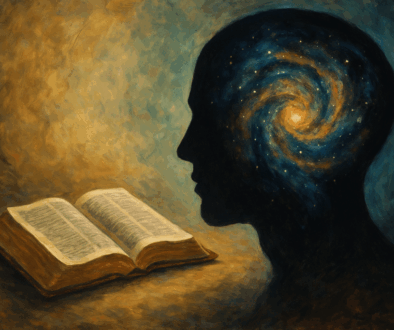Unconditional Positive Regard: Breaking Free from Judgment and Embracing Growth
\We live in a world of constant judgment.
We judge ourselves. We judge others. We feel the weight of expectations—social media pressures, cultural norms, and religious ideals—all shaping who we think we should be.
And that’s the problem.
Judgment doesn’t just come from outside—it embeds itself deep within. Self-criticism replaces self-compassion, and we lose sight of who we actually are. Instead of growing, we become trapped in an exhausting cycle of trying to be “enough.”
But what if growth didn’t require judgment?
What if true change came from acceptance, not criticism?
Carl Rogers and the Power of Acceptance
Carl Rogers, one of the most influential psychologists of the 20th century, knew this struggle well. He grew up in a strict Christian home where love and acceptance often felt conditional—tied to rules, performance, and moral scrutiny.
Through his work in therapy, he came to a radical realization:
People don’t transform when they are judged. They transform when they are deeply, unconditionally accepted.
In many ways, this mirrors the teachings of Jesus:
“Do not judge, or you too will be judged.”
(Matthew 7:1, NIV)
Jesus understood something profound—judgment alienates, while love restores. Rogers came to the same conclusion from a psychological perspective. He saw that most judgment wasn’t about morality but projection.
We judge in others what we struggle to accept in ourselves.
And when we turn that judgment inward, it breeds self-rejection—the very thing that prevents us from becoming whole.
What Is Unconditional Positive Regard?
Carl Rogers introduced the concept of Unconditional Positive Regard (UPR)—a radical form of acceptance that separates a person’s inherent worth from their actions.
UPR is not about approving of everything someone does. Instead, it affirms their core value as a human being, regardless of flaws or mistakes.
In his own words:
“By acceptance, I mean a warm regard for him as a person of unconditional self-worth—of value no matter what his condition, his behavior, or his feelings.”
(Rogers, 1961, p. 34)
What UPR Means in Practice:
✅ You are valuable even when you struggle.
✅ Your worth is not determined by your emotions or failures.
✅ Real transformation comes from acceptance, not fear of rejection.
What UPR Is NOT:
❌ It’s not about ignoring bad behavior.
❌ It’s not passive or indifferent.
❌ It does not divide people into “good” and “bad.”
Instead, UPR creates an environment where real, lasting change can happen—because it’s based on love, not fear.
The Link Between Love and Acceptance
Stephen Cope, a psychoanalyst and yoga influencer, learnt:
“Love is just accepting reality.”
(Cope, 1999)
This is what Rogers understood—acceptance and love are inseparable. When someone experiences true acceptance, they finally feel safe enough to be honest with themselves.
They don’t have to pretend.
They don’t have to perform.
And that’s where real transformation begins.
This idea aligns with agape, the Greek concept of unconditional love in Christianity:
“Agape (ἀγάπη) is the highest form of love; a self-sacrificial love that gives without expecting return.”
(Strong’s Concordance, G26)
This is the love described in Psalm 103:8:
“The Lord is compassionate and gracious, slow to anger, abounding in love.”
God’s love, like UPR, isn’t based on performance—it’s based on relationship.
But if divine love is unconditional, why do so many of us struggle to accept ourselves?
Why Is Self-Acceptance So Hard?
For many, self-acceptance feels like giving up.
We assume that self-criticism = self-improvement.
We believe that if we’re not constantly analyzing ourselves, we’ll never get better.
But depression investigator Andrew Solomon warns against this:
“The psychological supermodel of the twenty-first century is even more dangerous than the physical one. People are constantly examining their own minds and rejecting their own moods.”
(Solomon, 2001, p. 26)
We don’t just judge our actions—we judge our thoughts, emotions, and even our existence.
Carl Rogers, however, presents a radical alternative:
“We cannot change, we cannot move away from what we are, until we thoroughly accept what we are.”
(Rogers, 1961, p. 17)
The Paradox of Growth
Real growth doesn’t come from self-rejection.
It happens when we hold space for radical self-acceptance.
The more we accept ourselves, the more we actually become the person we were meant to be.
Kamil Ravikant describes this beautifully:
“Imagine the feeling of catching yourself loving yourself without trying. It’s like catching a sunset out of the corner of your eye. It will stop you.”
(Ravikant, 2012)
What if self-acceptance wasn’t the enemy of growth—but the key to it?
The Role of UPR in Therapy—and Beyond
Unconditional Positive Regard isn’t just for therapists. It’s a way of life.
When We Apply UPR, We:
✅ Create safe spaces where people feel seen.
✅ Strengthen relationships by removing judgment.
✅ Encourage real transformation—not forced change.
Biblical wisdom echoes this truth:
“Those who look to him are radiant; their faces are never covered with shame.”
(Psalm 34:5, NIV)
Where shame is removed, radiance appears.
Final Thoughts: A Path to Wholeness
Judgment creates division.
Acceptance creates transformation.
Carl Rogers believed that the greatest gift we can offer another person is freedom.
“For the Lord does not see as man sees; man looks at the outward appearance, but the Lord looks at the heart.”
(1 Samuel 16:7, NIV)
When we stop dividing people into “good” or “bad” and recognize their core worth, we align with God’s perspective.
And this isn’t just for others.
What if we applied it to ourselves?
What if we stopped striving to be “good enough” and simply accepted that we already are?
Living in Unconditional Positive Regard
✅ Acceptance allows healing.
✅ Self-compassion invites growth.
✅ Being loved as we are empowers us to become our best selves.
At the heart of every journey to wholeness is this:
The freedom to be fully seen—
And still be loved.
References & Further Reading
📚 Cope, S. (1999). Yoga and the Quest for the True Self.
📚 Ravikant, K. (2012). Love Yourself Like Your Life Depends On It.
📚 Rogers, C. R. (1961). On Becoming a Person: A Therapist’s View of Psychotherapy.
📚 Solomon, A. (2001). The Noonday Demon: An Atlas of Depression.
📚 Strong’s Concordance (Greek Lexicon – G26).
This is the heart of grace.
No performance. No judgment. Just love—transforming everything in its path.
🚀 What’s your experience with self-acceptance? Drop a comment below!




